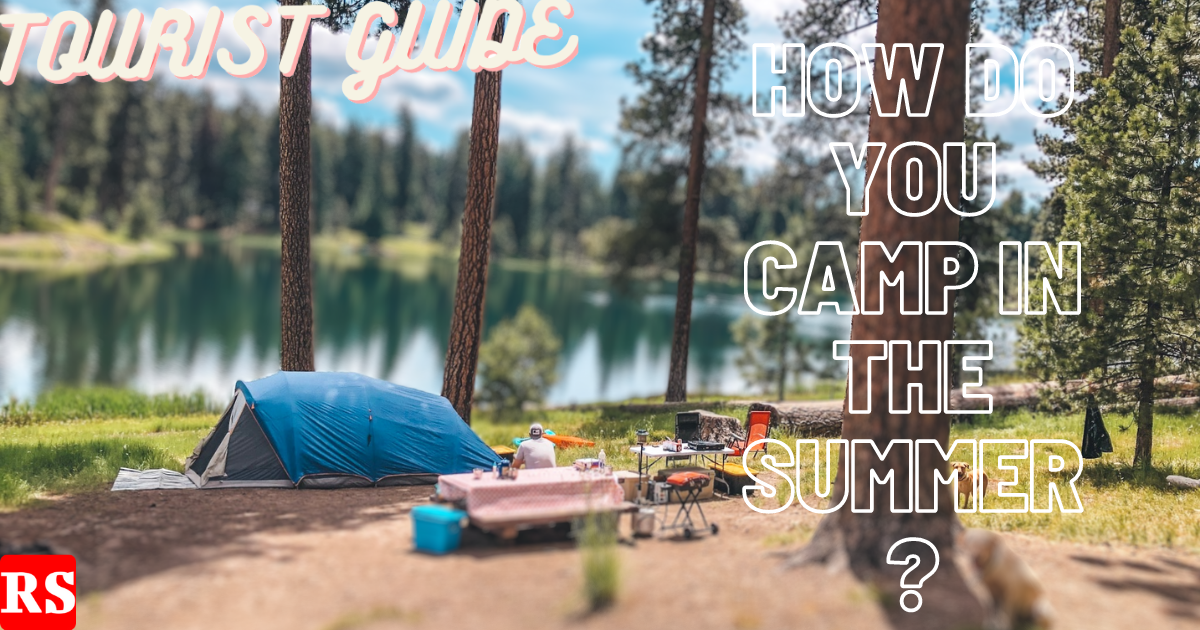How do you camp in the summer? #TOURIST GUIDE
Camping is one of the best ways to enjoy the outdoors and make lasting memories with family and friends. With summer just around the corner, it's the perfect time to plan a camping trip. However, it's important to take certain precautions and plan ahead to ensure a safe and enjoyable experience. In this article, we'll share some tips on how to camp in the summer.
Choose the right camping spot
The first step in planning a summer camping trip is to choose the right spot. Look for a location that offers shade, as well as access to water and a nearby restroom. You'll also want to check the weather forecast and ensure the site is not prone to flash floods or extreme weather conditions.Prepare for the heat
Summer temperatures can be extreme, so it's important to pack accordingly. Bring lightweight and breathable clothing, as well as a hat and sunglasses to protect your skin and eyes from the sun. Don't forget to pack plenty of water and electrolyte replacement drinks to stay hydrated.Set up camp in a shaded area
When setting up your campsite, look for a spot that provides natural shade, such as under a tree or a shelter. This will help keep you cool during the day and provide a comfortable sleeping environment at night. If natural shade is not available, consider bringing a canopy or tarp to provide shelter.Keep your campsite clean
Summer is also the season for bugs, so it's important to keep your campsite clean and free of food scraps and trash that can attract insects and wildlife. Store food and drinks in airtight containers and dispose of trash in designated bins.Plan activities for the heat of the day
When the sun is at its hottest, it's important to take a break and plan activities that don't require much physical exertion. Consider taking a nap in the shade, reading a book, or playing board games. Save more strenuous activities for the cooler hours of the day.Use insect repellent
Insects such as mosquitoes, ticks, and flies are common during the summer months. Use insect repellent containing DEET to keep them at bay. You can also wear long-sleeved shirts and pants to reduce the amount of exposed skin.Be prepared for emergencies
No matter how well you plan, emergencies can still happen. Be prepared by bringing a first-aid kit, a charged mobile phone, and a map of the area. Familiarize yourself with the location of the nearest hospital and emergency services.Consider the type of camping gear
Before you head out for your camping trip, consider the type of gear you'll need. Summer camping may require different equipment than camping in other seasons. For instance, you may need a lighter sleeping bag or a portable fan to keep cool at night. You can also consider bringing portable solar-powered chargers or batteries to keep your electronic devices charged.Follow campfire safety guidelines
Campfires are a popular part of the camping experience, but it's important to follow campfire safety guidelines. During the summer, fire risk can be high, especially in areas prone to wildfires. Before starting a campfire, check local regulations and fire restrictions, and always use designated fire rings or pits. Make sure to fully extinguish the fire before leaving the campsite.Plan for unexpected weather changes
Summer weather can be unpredictable, so it's important to be prepared for unexpected weather changes. Pack rain gear and extra layers of clothing in case of sudden drops in temperature. Be aware of the signs of heat exhaustion and heat stroke, and take immediate action if you or someone in your group shows symptoms.Respect nature and wildlife
While enjoying the great outdoors, it's important to respect nature and wildlife. Avoid disturbing wildlife or damaging natural resources by sticking to designated trails and campsites. Leave no trace by properly disposing of all trash and waste.Consider booking in advance
Summer is a popular season for camping, so it's a good idea to book your campsite in advance. Many campgrounds and national parks can fill up quickly, especially during holiday weekends. Check reservation requirements and fees for your chosen campsite and book early to avoid disappointment.By following these tips, you can ensure a safe and enjoyable summer camping trip. Whether you're camping in a tent, RV, or cabin, the great outdoors offers endless opportunities for adventure and relaxation. So pack your bags, gather your friends and family, and make memories that will last a lifetime.
How do you camp in the summer? Q & A
Q: What are some tips for choosing a camping spot in the summer? A: When choosing a camping spot in the summer, look for a location that provides shade, access to water and restrooms, and is not prone to extreme weather conditions or flash floods. Check the weather forecast and research the area's camping regulations and restrictions.
Q: How do you stay cool while camping in the summer?
Q: How do you stay cool while camping in the summer?
A: To stay cool while camping in the summer, pack lightweight and breathable clothing, a hat and sunglasses to protect from the sun, and plenty of water and electrolyte replacement drinks to stay hydrated. Set up camp in a shaded area and plan activities for the cooler hours of the day.
Q: How can you protect yourself from insects while camping in the summer?
Q: How can you protect yourself from insects while camping in the summer?
A: Insects such as mosquitoes, ticks, and flies are common during the summer months. To protect yourself, use insect repellent containing DEET, wear long-sleeved shirts and pants, and keep your campsite clean and free of food scraps and trash that can attract insects and wildlife.
Q: What should you do in case of an emergency while camping in the summer?
Q: What should you do in case of an emergency while camping in the summer?
A: In case of an emergency while camping in the summer, be prepared by bringing a first-aid kit, a charged mobile phone, and a map of the area. Familiarize yourself with the location of the nearest hospital and emergency services.
Q: What should you do if unexpected weather changes occur while camping in the summer?
Q: What should you do if unexpected weather changes occur while camping in the summer?
A: Summer weather can be unpredictable, so it's important to be prepared for unexpected weather changes. Pack rain gear and extra layers of clothing in case of sudden drops in temperature. Be aware of the signs of heat exhaustion and heat stroke, and take immediate action if you or someone in your group shows symptoms.
Q: Is it necessary to book a camping spot in advance during the summer?
Q: Is it necessary to book a camping spot in advance during the summer?
A: Yes, it's a good idea to book your camping spot in advance during the summer. Many campgrounds and national parks can fill up quickly, especially during holiday weekends. Check reservation requirements and fees for your chosen campsite and book early to avoid disappointment.
Q: What type of camping gear should you bring for summer camping?
Q: What type of camping gear should you bring for summer camping?
A: When camping in the summer, consider bringing lighter gear such as a sleeping bag appropriate for warmer weather and a portable fan to keep cool at night. You may also want to bring a portable solar-powered charger or batteries to keep your electronic devices charged. Be sure to pack appropriate clothing, shoes, and hats for the summer season.
Q: How can you safely start and maintain a campfire during the summer?
Q: How can you safely start and maintain a campfire during the summer?
A: Campfires are a popular part of the camping experience, but it's important to follow campfire safety guidelines during the summer, especially in areas prone to wildfires. Check local regulations and fire restrictions before starting a campfire, and always use designated fire rings or pits. Keep a bucket of water and a shovel nearby to fully extinguish the fire before leaving the campsite.
Q: What are some outdoor activities to enjoy during a summer camping trip?
Q: What are some outdoor activities to enjoy during a summer camping trip?
A: Summer camping trips offer endless opportunities for outdoor activities such as hiking, swimming, fishing, and kayaking. Research the area ahead of time to find nearby trails, lakes, rivers, and other outdoor recreation areas.
Q: How can you respect nature and wildlife while camping during the summer?
Q: How can you respect nature and wildlife while camping during the summer?
A: While enjoying the great outdoors, it's important to respect nature and wildlife. Avoid disturbing wildlife or damaging natural resources by sticking to designated trails and campsites. Leave no trace by properly disposing of all trash and waste. Respect wildlife by keeping a safe distance and not feeding them.
Q: Can you camp during extreme heat conditions in the summer?
Q: Can you camp during extreme heat conditions in the summer?
A: While camping during extreme heat conditions is not recommended, it's still possible to enjoy a camping trip during hot summer weather with proper preparation and planning. Choose a campsite with shade and access to water, plan activities for the cooler hours of the day, and stay hydrated by drinking plenty of water and electrolyte replacement drinks. Know the signs of heat exhaustion and heat stroke and take action if symptoms occur.
Q: What are some benefits of summer camping?
Q: What are some benefits of summer camping?
A: Summer camping offers a chance to enjoy the great outdoors, reconnect with nature, and spend time with friends and family. Camping can be an affordable and fun way to escape the city and enjoy activities such as hiking, fishing, and swimming. It can also provide an opportunity to unplug and disconnect from technology and daily stressors.


.png)


Post a Comment